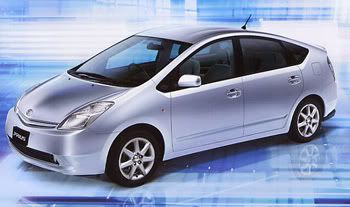
When we think of green cars, almost all of us start thinking about cars that really good gas mileage or hybrids that use both battery power and fuel or cars that use alternative fuels like E-80. Because these cars use less gasoline, we naturally think that they are green cars, or at least greener than what we are used to driving, such as my last car, the Jeep Grand Cherokee.
However, I was recently asked to review an article that explodes the myth that a prius is a greener car than a Hummer. In reading the article, I've definitely come to a different view as to what makes an automobile greener than another, and more significantly, how to evaluate green policies and initiatives in general.
What this article makes clear is that there are many different items to consider when looking at how green a car might be. For example, the easy criteria is that a car that gets 50 mpg appears greener than a car that gets 10 mpg. It's a no-brainer right? What further thought is necessary to make the determination that the 50 mpg car is greener than the 10 mpg car?
As it turns out, there's a lot to look at. Over the life of a car, from manufacturing to ultimate disposal and recycling, a car that gets 10 mpg may be a lot greener than a car that gets 50 mpg. To make the ultimate determination as to which car is greener, you have to look at the processes used in manufacturing the vehicle and which were more energy intensive. You have to look at the location the car was manufactured. You have to examine the transportation from the production site to the destination. You have to look at the practices in the production of the vehicle. You have to look at the materials that were used in the production of the vehicle. You have to look at the estimated lifespan of the vehicle in terms of durability. You have to look at where the vehicle will be used and if use of the vehicle would have a net positive or negative impact on the environment--such as on an off-road trail. You have to look at its impact resistance. On balance, after all of these areas and more are looked at, it's possible to conclude that a Hummer would be greener than a Prius.
You think I'm mad, don't you? But what you are not considering is that toxic metals are used in the components of the Prius hybrid's battery and that when the car has finished its useful life, it may be much more expensive to recycle that battery and dispose of it because it would be considered as hazardous waste. Additionally, a Prius is a small car. If it's in an accident, it's very likely that the car would be declared a total loss. If you just get one or two or three or even four years out of the car, in the final analysis, the energy used to manufacture the car and dispose of the car and the costs incurred would be greater than that of a car that's built for durability, such as a Hummer or a Grand Cherokee or a Land Rover which are built to be durable and to be used for a long time. Notwithstanding an accident, there is a period that varies from car to car that is the useful lifespan of the car. Maybe a Prius is designed to last 100,000 miles while a Hummer or a Grand Cherokee or a Land Rover has a useful life of 200,000 miles or 250,000 miles or 300,000 miles or more. When you look at the car in terms of it's lifespan, and the energy that is used to manufacture every component of a Prius vs the energy used to manufacture the components of a gas guzzler, over the expected life of the vehicle, the larger gas guzzler may actually consume less energy.
It's a fascinating concept, but it's what we usually don't consider when we make our purchases. For those of us truly interested in the environment and making purchases that have smaller carbon footprints, we really need to consider not just energy use of the product, but energy used in the production of the product and the estimated usable life of the product.
The carconnection.com article is really eye-opening. It's a little bit technical, but it's important to read. There's a lot more to being green than just looking at mpg, and I hope you'll take the time to look at the article so that you can make more informed decisions.
Thanks for reading.















2 comments:
If you think about it the process of making metal from raw ore is toxic no matter what the metal is. The extra ton of metal in a Hummer is enough to convince me that the Prius is a greener car. If the metals in the Prius battery can be recycled then there is no hazardous waste. 10% of a vehicles emissions are a result of it's manufacture. Not enough to put a gas guzzler ahead of a gas miser!
I don't think you are mad but I do think you are credulous - if you truly believe a Hummer is more environmentally friendly than a Prius, then surely you will believe anything - and also very ill informed. This particular claim has been floating around the Internet for years, and has many times been thoroughly debunked.For one example among many, see: http://www.thecarconnection.com/article/1010861_prius-versus-hummer-exploding-the-myth
Post a Comment